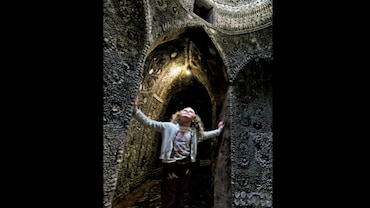- HOME
- /
- Features
- /
- Classic Reads
- /
The Commando with the Tattoo
Ganesh Dhangde was just six years old when he got lost. Twenty years later, his mother had a visitor
 Photographed by Mangesh S. Ambre
Photographed by Mangesh S. Ambre
Just before noon, as six-year-old Ganesh Dhangde got ready for school one day—it was the early 1990s—his mother Manda cradled her other child, one-year-old Ramesh. Her husband, a construction worker, had died recently and Manda’s income as a domestic help in several nearby middle-class homes in the town of Thane, just outside of Mumbai, was the family’s sole means of livelihood.
Ganesh walked down the Mama-Bhanje hillock on which their home stood in a shantytown amid innumerable similar dwellings. On his way, Ganesh was joined by Kharavi, his second-standard classmate. The kids soon ran into a teenager who Kharavi knew.
“Where to?” the older boy asked.
“School,” Kharavi replied.
“Come with me. Let’s do some sightseeing,” said the teenager. “We’ll be back by evening.”
“Let’s go,” Ganesh said trustingly, excited at the thought of playing truant for a change.
They soon reached the nearby Thane railway station and took a commuter train, alighting at a station after a while.
“Wait here,” the teenager told Ganesh, pointing to a bench. “We’ll go get something to eat.”
When the two didn’t return for a long time, Ganesh nervously searched the station. He wandered outside, looked in the street and returned to the bench. He wanted to ask for help, but was too scared of strangers. Just then, a train arrived.
Maybe this will take me home, Ganesh thought, and climbed aboard. As the crowded train sped along, he stared out hoping to locate his neighbourhood. Nothing seemed familiar. Tired and hungry, Ganesh drifted off to sleep. When he awoke, the train had halted, the compartment empty. He got off and looked around the huge railway terminus, which had at least a half a dozen crowded platforms. (Ganesh didn’t know this was Mumbai’s Victoria Terminus.)
After a while, he followed the crowd out onto the street. The roads and buildings were bigger than he had ever imagined. The din of vehicles was disorientating. One of these roads must lead me home, he thought desperately and walked till his feet hurt. The sun had begun to set when Ganesh came across a mandap, a temporary shrine, with a queue in front of it, receiving prasad. Ganesh quickly joined the line and soon got some of it to eat. He then took refuge at a corner of the mandap and fell asleep.
Meanwhile, Manda, having returned from her long day’s work, stared outside, wondering where Ganesh was. Kharavi and the older boy didn’t return too—so no one knew what had happened. One by one, her neighbours began to switch on their lights and kerosene lamps, bathing the Thane hill in a soft yellow glow. Manda then went around the neighbourhood, asking if anyone had seen Ganesh. Nobody had. It was too late to check at his school.
Terrified, she gathered some relatives and went to the local police, who promised to look into it. She returned home to spend the first of her innumerable sleep-starved nights. She held baby Ramesh close, praying for Ganesh to return.
When Ganesh awoke the next morning, he looked around, confused. With a horrible clarity he soon remembered what had happened the previous day. He wandered around, sleeping on footpaths and railway benches and eating whatever left-overs he could get from roadside eateries. It must have been on the third day that, exhausted by the heat, Ganesh was sitting under a bridge near a beach with some huts nearby. He began to cry.
Just then, a woman, who was with a boy about his own age, stopped and asked Ganesh, “What’s your name? Where are you from?”
“From Mama-Bhanje,” he sniffled. “My name is Ganesh.”
Not knowing where that was, the woman took Ganesh with her. “You can stay with us,” the little boy urged Ganesh. “I’m Sainath.” Ganesh wanted to refuse, but had no choice.
Ganesh followed them to their beachside hut, where he met Sainath’s father, a fisherman, who took him in. As the months passed, they even began taking him on fishing trips. Ganesh began adjusting to the new life. When the fishing season ended, Ganesh was told to go with Sainath and earn some money.
Sainath, clutching an old broom and a rag, took Ganesh to a railway station. The kids boarded a city train and Sainath began cleaning compartment floors. After that commuters dropped some coins in his outstretched hands. Soon Ganesh was doing the same.
As the months rolled by nothing could ease the pain Ganesh felt when he remembered his real family. Is my mother still looking for me? Ganesh would stare at a tattoo on the inner side of his right elbow, done when he was a baby—not an uncommon practice in some Maharashtrian neighbourhoods. His tattoo read ‘Manda R. Dhangde’ in Marathi. It was the only link he had left with his family.
One day, Ganesh was crossing the road near the hut when a speeding car came out of nowhere. Then it was all dark for him. When he awoke, he was in a government hospital bed. Sainath’s parents came to visit him a couple of times, but after the doctors asked them a few questions, Ganesh heard them say that he was not their son. Ganesh never saw Sainath or his parents again. He remained in the hospital for over a month, recuperating from his head injuries. When he recovered, hospital authorities sent him to the Thelma J. R. D. Tata Anand Kendra Trust orphanage in Mumbai’s Worli area.
Soon Ganesh was enrolled in the first standard again in the local Love Grove Municipal School. For the next few years, in addition to his studies, Ganesh learnt to weave bedcovers from yarn and did odd jobs which even earned him some cash, which he’d spend on snacks in the school canteen. By the sixth standard, Ganesh began doing well in the school’s athletic events. Soon he was in the kho-kho team with much bigger boys. With all his running and playing, he grew big and strong. He loved sports and never missed practice.
Back at Mama-Bhanje, Manda had kept up the search for her son. It had been six years. Manda visited the police station countless times, but they never had anything to report. She visited several children’s homes, hospitals and police stations all over the surrounding areas. She even wondered whether her son was kidnapped, and if so, what he must now be doing. Tens of thousands of children are lost every year in India, many never to be found again. Eventually, Manda’s relatives convinced her to get remarried, hoping it would bring her some consolation. Manda agreed.
Meanwhile, one day during kho-kho practice, a PT teacher from another school who was impressed with Ganesh, told him about Krida Prabodhini, a state-level government program that housed and trained young athletes. He soon excelled in many sprint events and qualified. Ganesh and his peers were sent to sports hostels at various facilities of India. Ganesh got Thane, but had no idea how close he now was to his mother.
Studying in standard seven at a Thane school, he continued his promising career as an athlete. In 2006, he won the gold medal for pole vault at the national school games. Even though things were now going well for Ganesh, the teenager felt rudderless. Surendra Modi, his coach, gave him some direction.“Son,” he said, “how long are you just going to be an athlete? You need to find a job.” Surendra advised the lean, well-built Ganesh to join the police. After some thought, Ganesh agreed and cleared the recruitment tests easily.
After his training, Ganesh was inducted as a constable into the police force in Thane. He spent the next couple of years doing VIP guard duty, transferring prisoners or quelling minor disturbances. Then, one morning early last year, Ganesh noticed a crowd of young men on the police grounds. They were all aspirants to the elite Quick Response police commando team. He spoke to them and got interested. Ganesh took the preliminary test, where they needed to run five kilometres in under 25 minutes. Ganesh finished in 22, coming third.
Next, he and other prospective candidates were sent to an army base for two months’ training, after which Ganesh and a few other successful candidates reported to a new commando unit. On Ganesh’s first day in the Quick Response Team, his chief, Inspector Shrikant Sonde, moved through his new charges, who had all brought family members along. For Sonde, this was an annual ritual—learning all about his ‘new kids’ and their backgrounds—so that he could help them out, if necessary, and keep them as stress-free and ready to focus on their tough jobs.
“Young man, tell me about yourself,” Sonde said to Ganesh.
“Ganesh Dhangde, sir.”
“What about your family?”
“I know nothing about my family, sir,” Ganesh said hesitantly, explaining his peculiar situation and revealed the tattoo on his arm. Moved by Ganesh’s story, his life at the orphanage and his sports record, and impressed by the fact that he was one of the chosen few who made it to his team despite his underprivileged background, Sonde became interested. He examined the tattoo. “We’ll help you find your family,” he said.
Sonde instructed his team to look for that family name on online social networks. They were at it for almost a month, but that didn’t work—a surname like that is common in Maharashtra. Ganesh enlisted the help of fellow constable Sumit Gandhwale and together, they scoured missing persons records at police stations all over Mumbai and searched the internet, but their efforts were futile.
“Why don’t you go back to the orphanage in Worli?” Sonde told Ganesh, hoping something there would jog his memory. In September last year, Ganesh visited the old orphanage with Sumit. They found no clue there—until Ganesh met Shamsuddhin Abdul Shaikh, the elderly cook whom they called Anna. He remembered something.
“Long ago when you were first brought here,” Anna recalled, “the doctors said that right after your accident you were repeatedly saying ‘mama-bhanje’.”
Although that meant ‘uncle-nephew’ in Hindi, neither Anna nor the others had any idea what that signified. Now, even Ganesh had forgotten that term. When he relayed that information to his boss, Sonde did some reckoning. He couldn’t have been saying 'nephew', Sonde thought. A six-year-old Marathi-speaking kid would say mama-bhacha, not the Hindi mama-bhanje.
“I think it could be the name of a place,” Sonde told Ganesh. There are several spots called Mama-Bhanje all over India, mostly dargahs, burial sites of Muslim holy men. But it didn’t take long for Sonde’s men to find one such dargah in their district itself—in the Indira Nagar hillocks in Thane. That was only a 20-minute drive away from his hostel!
On 4 October 2013, Ganesh, accompanied by Sumit and two other policemen friends, went to Indira Nagar. Suddenly, everything seemed familiar to Ganesh. The hutments, the masjid, an old black water tank. It was like some long-forgotten dream. I used to walk here as a child.
Even so, finding his family among the thousands living on the vast hillside looked daunting—if they’re still here. They searched for a couple of hours. But no one seemed to know any Manda Dhangde. As they climbed the hill, they spoke to an old man.
“Any Manda in this area?” Ganesh persisted.
“Yes,” the old man said. “I don’t know their houses, but there are two or three women with that name.”
Ganesh’s spirits rose. They soon came across a group of women and a young girl chatting in one of the lanes.“Does anyone know Manda Dhangde?” Ganesh asked. The girl nodded. She gestured for Ganesh and his friends to follow her and led them up to a hut. Its door was a faded blue and covered with an assortment of stickers of cartoon characters—a sign that there were kids here. Ganesh peeked inside. A few adults were sitting on brown plastic chairs. They were observing shraadh, the ceremony held in memory of family members who had departed. A few children sat on a large bed. A woman was moving among them, distributing food.
“Is there any Manda Dhangde here?” Ganesh asked, his voice quivering.
“Yes,” he heard.
“We’re from the police,” Ganesh said. “We need some information.”
Another woman emerged. She was thin and small, with sunken cheeks. Grey streaks running through her hair.
“I am Manda. How can I help you?”
 Reunited with Manda. “I want to take care of her now,” says Ganesh. Photographed by Mangesh S. Ambre
Reunited with Manda. “I want to take care of her now,” says Ganesh. Photographed by Mangesh S. Ambre
“How many people live in your house?” Ganesh asked. “My two sons, two daughters and me,” she said. So the others present were relatives.
“Did you have another boy?”
“I did,” she confirmed sadly. “His name was Ganesh. He was lost when he was a little boy. It’s been 20 years.”
“How would you recognize your son?” asked Ganesh.
The question startled her. “My full name was tattooed on his arm,” the woman said. “Manda R. Dhangde.”
Now, Ganesh didn’t dare speak, but showed her the tattoo. Mother and son embraced, crying for a long time. Finally, Manda took Ganesh inside to meet his stunned but overjoyed family.
“Ramesh,” Manda told a tall, lean 21-year-old standing by, “your brother has returned.”
Ganesh learnt that Manda, by now widowed once again, had three more children: Vanita, 18, Hrithik, 13, and Vandana, 12, was the girl who had brought them up the hill to her home! Coincidentally on a day dedicated to those who had left them.
Soon after the reunion in October last year, Anna, the old cook with the sharp memory, passed away—he had lived just long enough to become a key link in this story. Ganesh has moved back to his Mama-Bhanje home, eager to make up for two lost decades.
Back in the old environs, his childhood memories too returned. He also learnt that his classmate Kharavi and the teenager who took the boys on that train were never seen again. “I want to take care of my mother now,” Ganesh says.
“I must educate my brothers and sisters and give them a good future. My life has been full of unusual experiences. I’m just happy I finally have a family.”
From Reader's Digest June 2014






